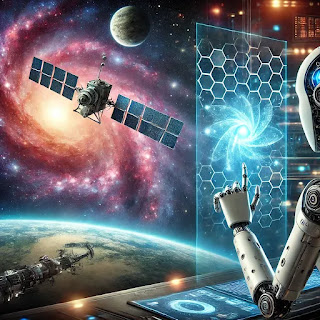AI in Space Exploration: Charting the Final Frontier
Introduction
Space has always been a domain of human ambition, but now artificial intelligence is playing a crucial role in taking us farther than ever before. From navigating rovers on distant planets to identifying habitable exoplanets, AI is becoming an indispensable tool in humanity’s quest to explore the universe. In this post, we’ll dive into an extraordinary example of how AI is shaping space exploration: the discovery of a new exoplanet by a machine learning algorithm.
The Story: AI Finds a Planet
In 2018, researchers using NASA’s Kepler Space Telescope discovered an exoplanet named Kepler-90i. What made this discovery remarkable was that it wasn’t a human who found it—it was an AI. Google AI researchers trained a neural network to sift through Kepler’s vast dataset of over 14 billion data points. The algorithm identified subtle patterns in the light curves of distant stars, revealing the presence of Kepler-90i, a rocky planet orbiting a sun-like star 2,500 light-years away.
This discovery marked the first time an AI had identified an exoplanet, proving that machine learning could analyze astronomical data with incredible precision. The neural network also found evidence of other planetary candidates, showcasing its potential to accelerate discoveries in astronomy.
Why This Matters
AI’s role in space exploration goes beyond planet-hunting. It’s helping scientists tackle some of the biggest challenges in astronomy and beyond:
- Autonomous Rovers: On Mars, AI powers the Perseverance rover, enabling it to navigate terrain, avoid obstacles, and analyze rock samples without constant human input.
- Telescope Optimization: AI algorithms enhance the efficiency of telescopes, helping researchers capture clearer images of celestial phenomena.
- Spacecraft Maintenance: Predictive AI models are being used to monitor and maintain spacecraft systems, preventing failures in the harsh environment of space.
With AI’s ability to process massive datasets and perform complex analyses, it’s opening up new possibilities for exploring the cosmos.
The Ethical and Technical Challenges
While AI is transforming space exploration, it’s not without challenges. One major issue is data bias; algorithms trained on incomplete or skewed datasets might overlook important discoveries. Additionally, the reliability of AI in high-stakes scenarios, such as autonomous spacecraft, must be rigorously tested to ensure mission success.
Ethically, there’s the question of how much decision-making should be delegated to machines. As AI takes on more autonomous roles, ensuring transparency and accountability will be key.
The Future of AI in Space
The future of space exploration will likely be a partnership between humans and AI. As missions venture farther into the cosmos, AI’s ability to operate autonomously will be critical. Imagine a spacecraft equipped with an AI capable of making real-time decisions as it explores distant moons or asteroid belts. Or an AI system that identifies potential Earth-like planets based on atmospheric signatures.
These advancements not only bring us closer to understanding our universe but also lay the groundwork for future human exploration and even colonization of other worlds.
Takeaway
AI is revolutionizing space exploration by making discoveries faster, more efficient, and more precise. As we continue to push the boundaries of what’s possible, AI will be at the forefront, helping humanity chart the final frontier.
Call to Action:
What excites you most about AI’s role in space exploration? Do you think AI will one day lead missions completely autonomously? Share your thoughts below!
